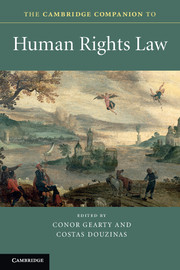Description
The Cambridge Companion to Human Rights Law
Cambridge Companions to Law Series
Coordinators: Gearty Conor, Douzinas Costas
Captures the essence of the multi-layered subject of human rights law in a way that is authoritative, critical and scholarly.
Language: English
The Cambridge Companion to Human Rights Law
Publication date: 11-2012
369 p. · 15.2x22.8 cm · Paperback
Publication date: 11-2012
369 p. · 15.2x22.8 cm · Paperback
The Cambridge Companion to Human Rights Law
Publication date: 11-2012
372 p. · 15.2x22.9 cm · Hardback
Publication date: 11-2012
372 p. · 15.2x22.9 cm · Hardback
Description
/li>Contents
/li>Biography
/li>
Human rights are considered one of the big ideas of the early twenty-first century. This book presents in an authoritative and readable form the variety of platforms on which human rights law is practiced today, reflecting also on the dynamic inter-relationships that exist between these various levels. The collection has a critical edge. The chapters engage with how human rights law has developed in its various subfields, what (if anything) has been achieved and at what cost, in terms of expected or produced unexpected side-effects. The authors pass judgment about the consistency, efficacy and success of human rights law (set against the standards of the field itself or other external goals). Written by world-class academics, this Companion will be essential reading for students and scholars of human rights law.
Introduction Conor Gearty and Costas Douzinas; Part I. All Kinds of Everyone: 1. 'Framing the project' of international human rights law: reflections on the dysfunctional 'family' of the Universal Declaration Anna Grear; 2. Restoring the 'human' in 'human rights' - personhood and doctrinal innovation in the UN disability convention Gerard Quinn with Anna Arstein-Kerslake; 3. The poverty of (rights) jurisprudence Costas Douzinas; Part II. Interconnections: 4. Foundations beyond law Florian Hoffmann; 5. The interdisciplinarity of human rights Abdullahi A. An-Nacim; 6. Atrocity, law, humanity: punishing human rights violators Gerry Simpson; 7. Violence in the name of human rights Simon Chesterman; 8. Reinventing human rights in an era of hyper-globalisation: a few wayside remarks Upendra Baxi; Part III. Platforms: 9. Reconstituting the universal: human rights as a regional idea Chaloka Beyani; 10. The embryonic sovereign and the biological citizen: the biopolitics of reproductive rights Patrick Hanafin; 11. Spoils for which victor? Human rights within the democratic state Conor Gearty; 12. Devoluted human rights Chris Himsworth; 13. Does enforcement matter? Gerd Oberleitner; Part IV. Pressures: 14. Winners and others: accounting for international law's favourites Margot E. Salomon; 15. Resisting panic: lessons about the role of human rights during the long decade after 9/11 Martin Scheinin; 16. What's in a name? The prohibitions on torture and ill treatment today Manfred Nowak; 17. Do human rights treaties make enough of a difference? Samuel Moyn.
Conor Gearty is Professor of Human Rights Law at the London School of Economics and Political Science. He is a specialist in European and UK human rights law, as well as in terrorism law and civil liberties, on each of which subjects he has written extensively. He is also a barrister and a founding member of Matrix chambers from where he continues to practice.
Costas Douzinas is Professor of Law at Birkbeck, University of London and Director of the Birkbeck Institute for the Humanities. In his many books and the talks he has given around the world, he has developed a position on human rights which seeks to retain the radical and emancipatory power of the term without however accepting the arid and self-interested arguments of the powerful (of both the scholarly and political variety).
Costas Douzinas is Professor of Law at Birkbeck, University of London and Director of the Birkbeck Institute for the Humanities. In his many books and the talks he has given around the world, he has developed a position on human rights which seeks to retain the radical and emancipatory power of the term without however accepting the arid and self-interested arguments of the powerful (of both the scholarly and political variety).
© 2024 LAVOISIER S.A.S.




